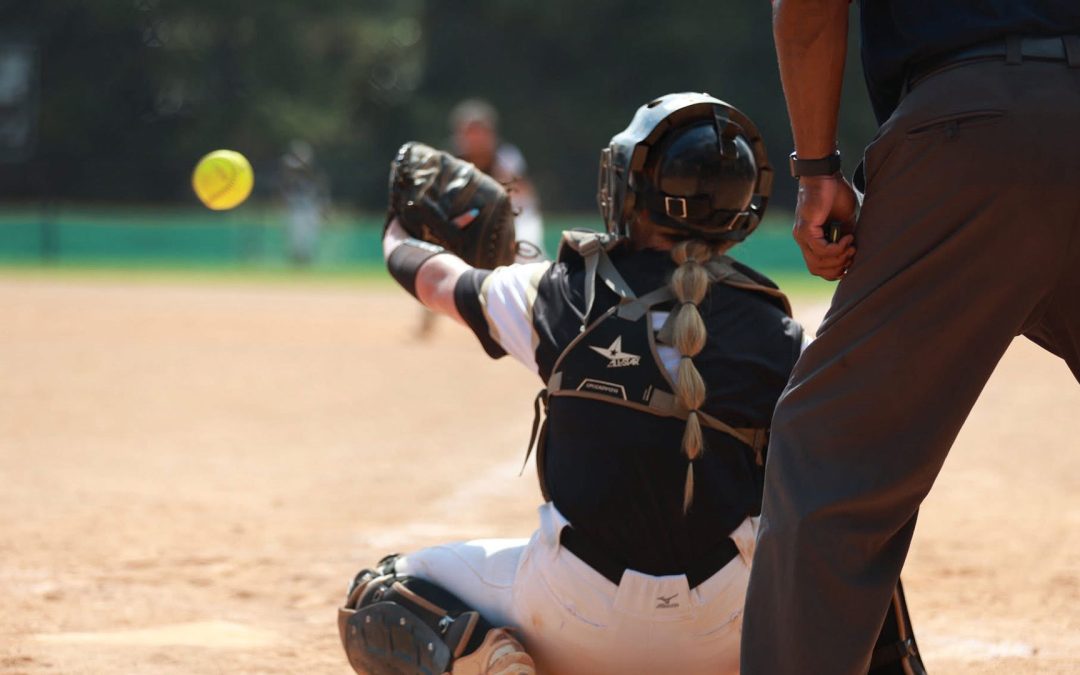The catcher is one of the most demanding and critical positions on the softball field. Catchers don’t just catch — they lead. They control the game from behind the plate, manage the pitching staff, and serve as the defensive anchor. So when college coaches are recruiting a catcher, they’re not just looking for someone with a strong arm — they’re looking for a complete player.
Here’s what college coaches really look for in a catcher during the recruiting process:
1. Strong Arm & Quick Pop Time
Let’s start with the obvious: coaches want catchers who can shut down the run game. That means a strong arm and a quick release.
💥 Target pop time:
- D1-level: Under 1.9 seconds
- D2/D3/NAIA: 2.0–2.1 seconds or faster
But it’s not just about raw arm strength. Coaches want catchers who get rid of the ball quickly, throw with accuracy, and make smart decisions about when to throw.
2. Receiving & Framing Skills
Pitchers thrive when they trust their catcher. College coaches look for catchers who:
- Stick the pitch (don’t drag the glove)
- Frame strikes consistently
- Present a quiet, calm target
- Make borderline pitches look like strikes
Framing is subtle but powerful. A great receiver can steal multiple strike calls per game — and coaches notice that.
3. Blocking Ability
If you want to catch in college, you must be able to block. Coaches look for catchers who:
- React quickly to balls in the dirt
- Keep the ball in front
- Recover fast and stay athletic
Bonus points if you can block both sides of the plate consistently and stay low without losing quickness.
4. Leadership & Communication
This is a huge factor. Catchers are the on-field leaders, especially in the college game. Coaches want to see:
- Vocal leadership
- Confidence when calling timeouts or guiding pitchers
- A calming presence in tense moments
- Maturity and the ability to handle pressure
A coachable, confident catcher who can lead a team is often more valuable than one with just great physical tools.
5. Game IQ & Situational Awareness
Catching is a mental grind. Coaches want athletes who:
- Understand game situations (e.g. bunt defenses, runners on, outs)
- Know when to calm the pitcher down
- Anticipate the next play
- Can call pitches (at certain levels) or understand pitch sequencing
Being a “student of the game” can set you apart fast.
6. Soft Skills & Coachability
College coaches often say: “I can teach skills, but I can’t teach attitude.” They want catchers who:
- Show great effort in warm-ups and bullpens
- Take feedback well
- Work hard without needing to be asked
- Stay mentally tough even after a mistake
How you carry yourself during a game, between innings, and in the dugout matters — big time.
7. Offensive Value (Bonus but Important)
While defense is the top priority, a catcher who can hit adds major value.
- Power and gap-to-gap contact are ideal
- Coaches love catchers who can work counts and get on base
- Being a consistent run-producer can give you an edge over a similar defensive catcher
That said, if you’re elite behind the plate, some coaches will take defense-first — and develop your hitting over time.
8. Durability & Toughness
Catching is physically grueling. Coaches want athletes who are:
- Physically fit and able to catch long games or tournaments
- Resilient through bruises, foul tips, and long innings
- Tough — mentally and physically
They’re looking for players who grind, not ones who break.
Final Thoughts
If you want to catch at the college level, be the complete package: skilled, smart, tough, and a leader.
College coaches are looking for more than a strong arm — they’re looking for someone who can manage their pitchers, control the tempo of the game, and be the backbone of their defense. If you can do that, your chances of being recruited go way up.
So whether you’re sending out film, attending camps, or playing in showcases, always be thinking: “What does this coach need behind the plate?”
Now go be that catcher.

